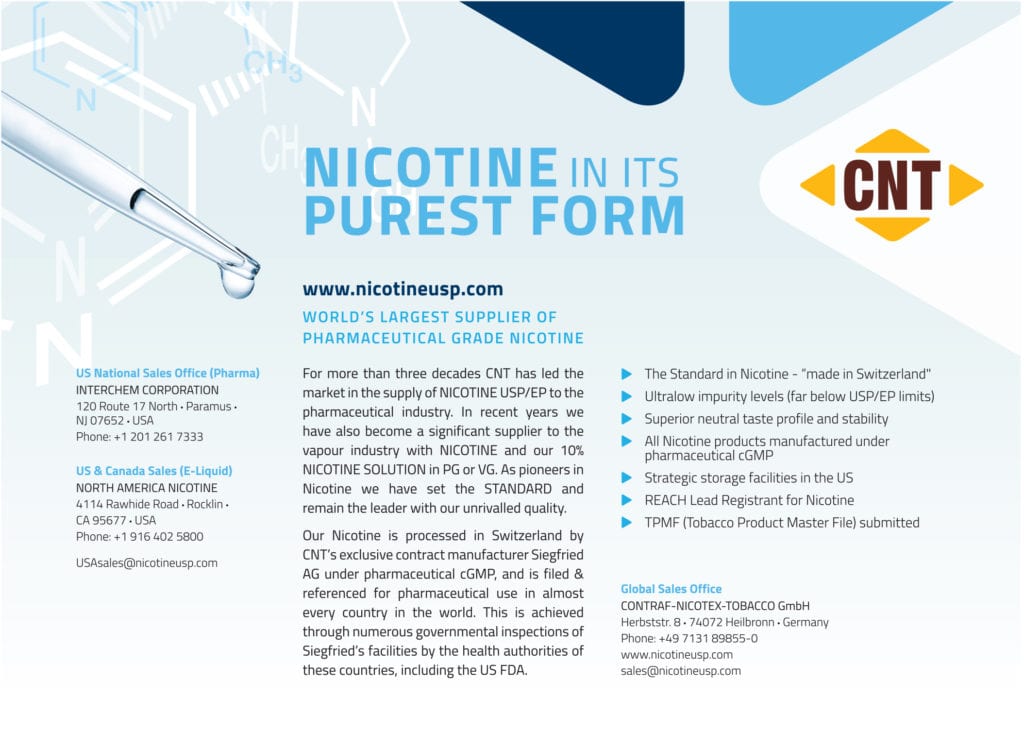
Tobacco companies should be allowed to transition to harm reduction products, but under history’s watchful eye.
By George Gay
I don’t go along with the oft-repeated idea that, if we don’t remember the past, we are condemned to repeat it. This is not to say that particular versions of the past, whether real or invented, are not repeated, just that mostly it is impossible to know whether an event is an original or a repeat. For one thing, memories of the past are mostly not the result of direct experiences and so are not fixed and generally agreed. History, into which the past is roughly sieved, is never objective. It is most often weighted, open to interpretation and subject to disagreements.
I would be happy to consign all versions of history to oblivion, but then, as somebody famously said, there would be no point. In saying that we consign something to oblivion, we suggest that it is simultaneously forgotten and preserved. We are incapable, it seems, of letting go of favorite versions of the past, which get stuck to our shoes like carelessly discarded chewing gum.
Specifically, it concerns me that history, or versions of it, are being allowed to act as a drag on advances that could be being made in reducing the health consequences of cigarette smoking. I recently attended a nicotine conference and, as part of one generally good presentation, a still of a video was shown in which CEOs from U.S. tobacco companies told a Congressional oversight committee sitting a quarter of a century ago that they did not believe nicotine was addictive. I have seen this still, or similar ones, on more occasions than I care to remember, often presented as shorthand for how heinous the tobacco industry was or even is.
But one problem in my view is that what is presented here is a version of history directed by the enemies of the tobacco industry who feel they won the moral war. In other words, a history presented by the victors. It implies that those CEOs were willing to lie about something that everyone knew to be true—that nicotine was and is addictive. There is no time for nuance in a single still. There is no room for other interpretations.

For instance, were all the CEOs referencing the same, agreed version of addiction? And if, as generally supposed, they were all referencing the same definition of addiction, were they acting in bad faith, or were they, or at least some of them, not informed or badly informed by the scientists working in their companies who did believe that nicotine was addictive? Is it possible the CEOs were right and everybody else was wrong? Was one or more of them delusional and in need of help?
I ask above whether all of the CEOs were referencing the same definition of addiction and, frankly, I have no idea what the answer to that question is. I tend to the view, however, that they were, because I find it difficult to believe their legal teams would have allowed them to give the answers they did without knowing exactly what they were signing up for.
But I have one troublesome doubt in this regard. As far as I am aware, five of the seven CEOs who testified in 1994 said they believed that nicotine was not addictive; one said he believed that neither nicotine nor his company’s products were addictive while another said he believed cigarettes and nicotine clearly did not meet the classic definition of addiction because there was no intoxication.
The reference to “the classical definition” surely suggests that it was admitted there was more than one definition, which possibly means the answers need to be interpreted individually. Additionally, it cannot be ruled out that even if a CEO knew that his company’s scientists believed nicotine to be addictive, his personal view might have been different. We all become fed up with experts at one time or another.
The oversight committee’s hearings later revealed that all sorts of skulduggery had gone on; for instance, at least some of the people within these companies knew or believed that nicotine was addictive and that some had manipulated their products to try to make them more addictive, whatever that means in the context of whatever definition you are using.
But where did this information come from? It came in part from documents voluntarily handed over to the committee at the behest of the CEOs. This seems to suggest that the CEOs were either not aware of what was in those documents or that they were not aware of all that was in them.
But let’s say for the sake of argument that the CEOs, or at least some of them, told the committee they believed nicotine was not addictive, knowing that all this skulduggery had been going on—would they not have been acting in exactly the way they would have been expected to act—perfectly in line with business and societal norms? After all, they were CEOs charged with maximizing company profits at a time when greed was good, so there was some collateral damage. But then, starting only with the “A’s,” look at the alcohol, arms and automobile industries.
I don’t want to defend what the CEOs said during that committee hearing or what the tobacco industry got up to because I don’t know enough about this stuff. But it seems a little odd to me that, at a time when the U.S. was deep in the grip of neoliberal dogma, these men (they were all men) were condemned for following the logic of the market and maximizing profits.
But the committee seemed to want to set itself above all of this tacky business stuff, somewhere on the moral high ground. This is, in part, what the chairman on April 14, 1994, said in opening the hearing: “For decades, the tobacco companies have been exempt from the standards of responsibility and accountability that apply to all other American corporations. … This hearing marks the beginning of a new relationship between Congress and the tobacco companies. The old rules are out; the standards that apply to every other company are in.”
I would imagine that what a lot of people took away from this, whether it was meant or not, is that there goes the wicked tobacco industry again, avoiding its responsibilities for decades. But, if the finger is to be pointed anywhere, it should surely be pointed at Congress, which, as is more or less admitted by the chairman, allowed this situation to exist and to continue. It cannot be expected that businesses will, in the normal course of things, lobby Congress to saddle themselves with additional regulations.
I thought the opening remarks strange in another way also. The chairman at one point says: “Nearly a half million Americans die every year as a result of tobacco. This is an astounding, almost incomprehensible statistic. Imagine our nation’s outrage if two fully loaded jumbo jets crashed each day, killing all aboard. Yet that is the same number of Americans that cigarettes kill every 24 hours.”
As I see it, the chairman is making a comparison as part of what I suppose was meant to be a moral argument, but that comparison does not stand up to even basic scrutiny. As human beings, we take risks every day, balancing those risks, either consciously or unconsciously, against perceived benefits. Smoking and drinking alcohol are two obvious everyday examples of this. And so, too, for a lot of people (though perhaps not recently) is getting on an airplane. As things stand, people get on airplanes because they are overwhelmingly safe to use, so the benefit-to-risk ratio is hugely positive.
But it is inconceivable that if two jumbo jets crashed each day in the U.S. alone, people would still board them. The chairman was ignoring the fact that people make risk assessments so as to conjure up a situation that would never occur. People understand that smoking might cause them to die in 40 years to 50 years, and they understand that falling from 30,000 feet brings on death a lot quicker.
The idea of risk can be manipulated, and often is, as in the story about the therapist with a patient who is still nervous of flying even after being told that the chances of a bomb being on board a plane is a billion to one; the therapist advises her to take her own bomb on board next time she flies because the chances of there being two bombs on board are a trillion to one.
I need to emphasize that I am not trying to defend the past behavior of the tobacco industry or the CEOs in question. What concerns me here is that a single picture is being regularly presented as telling a story that is far simpler than it really is. What has passed into history—what I would imagine most people would “remember” from the picture of the subcommittee hearing—was that all of the CEOs lied in saying that nicotine was not addictive. I doubt that many people would realize that what they said was they believed nicotine was not addictive, let alone the back story to this event.
This is the problem with the versions of history we drag around with us. In the end, what did the hearings bring about? Reputational damage to tobacco companies for sure. But they are still operating in one form or another, and part of their business is largely unchanged. It is said that the number of smokers fell after the hearings, but who knows whether the hearings were a causal factor in this.
It is more interesting to examine what continued: taxes. Local, state and federal agencies continued to benefit from people smoking through the taxes they paid, and later was added the proceeds of the Master Settlement Agreement, very little of which is ever spent on ameliorating the toll of tobacco smoking; so who gets to stand on the moral high ground?

Well, the answer to that question might seem strange. I say above that it is not usual for businesses to lobby Congress to try to saddle themselves with additional regulations. But, in fact, odd as it might seem, this is exactly what many nicotine and tobacco companies have been doing in recent times.
I’m not saying they are perfect and that part of this new way of thinking hasn’t to do with competition, but in part it is a genuine attempt to ensure that the new generation products that are being developed and offered to help people transition to safer forms of nicotine consumption are not causing, and can be seen not to be causing, unintended consequences.
And for those people who tend still to be wedded to the idea portrayed by the still of the tobacco CEOs, it is worth noting that, importantly, in the recent past the major tobacco companies have found a way of offering reduced-risk products while roughly maintaining the sorts of business models that were so successful for them in the past. Does this put them on the moral high ground? Of course not, but it has mapped out a route to that ground.
Times are changing, and we desperately need to stop slowing the transition into a new world of nicotine consumption by constantly dragging behind us a little-examined history of what went on 20 years to 30 years ago—a time that few working in the nicotine and tobacco industries could probably remember.
There was a furor just after I started to write this piece about a proposed takeover by Philip Morris International of the pharmaceutical company Vectura, which in news reports was said to be developing inhaled treatments for respiratory diseases. Why the furor? Well, it’s all about history, of course. PMI has in the past sold traditional cigarettes and still does; so, the detractors claimed, we cannot let it near a pharmaceutical company.
There seems to be no way such people can accept that, in order to move ahead with the transition from smoking to other forms of nicotine consumption, we have to look at innovative, even daring ways of doing things.
I have no insights into what PMI is up to beyond what has been reported in the general press, but it doesn’t take a genius to figure out that it might be looking, in part, to benefit from some cross fertilization of ideas in respect of inhalation technologies—ideas that just might allow it to make a breakthrough in respect of reduced-risk, next-generation nicotine products.
At least we should allow companies to try such things—while keeping an eye on them, of course. We should not let history stand in the way.


